On 13 August 2025, at APAG Headquarters in Hà Nội, the Academy of Public Administration and Governance (APAG) convened a seminar entitled “Diagnosing and Resolving Constraints Facing Commune-Level Governments in the Context of Operating a Two-Tier Local Government System.” Assoc. Prof. Dr Nguyễn Bá Chiến, President of APAG, and Prof. Dr Nguyễn Quốc Sửu, Vice President, co-chaired the event.
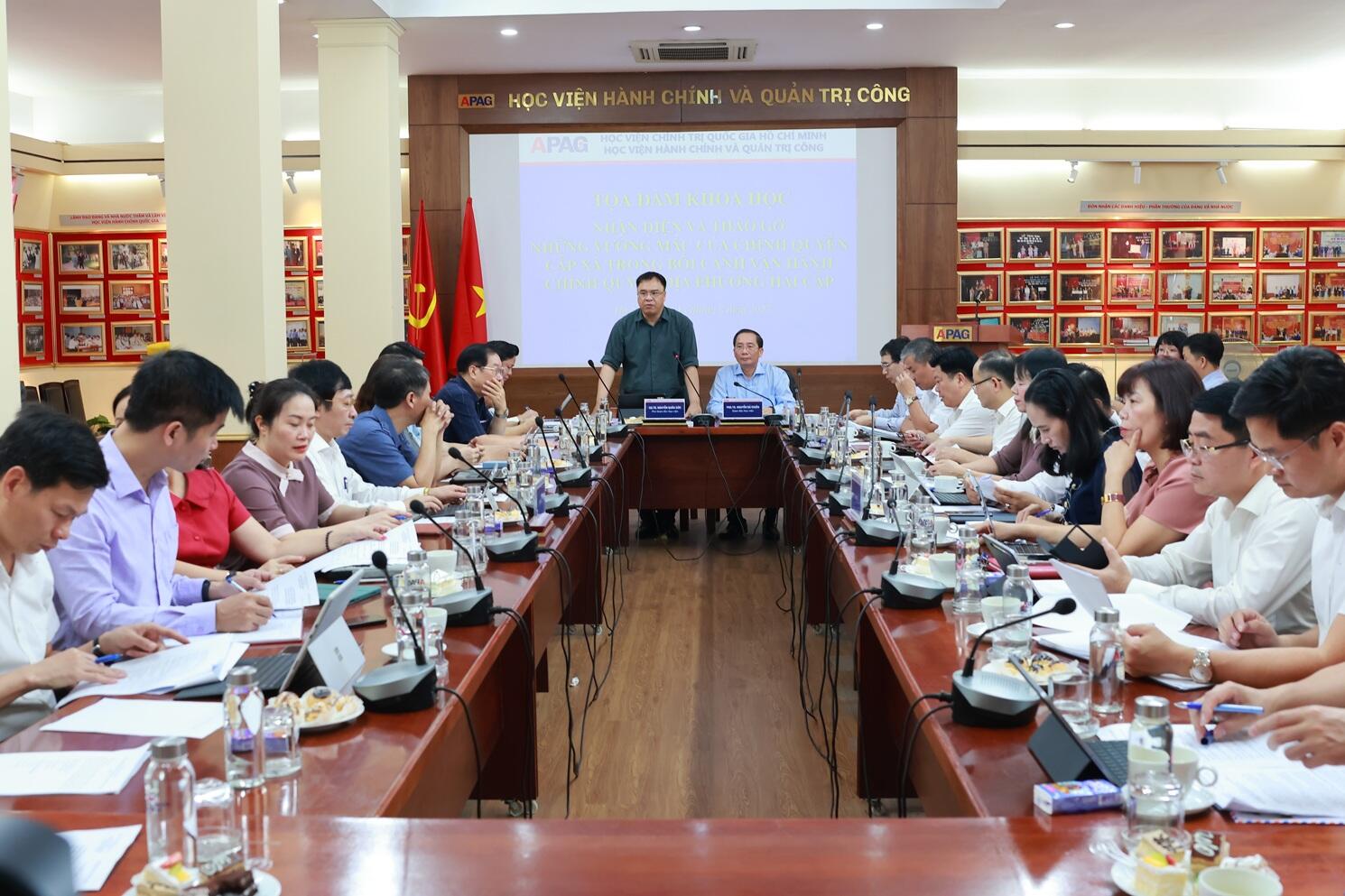 General view of the seminar.
General view of the seminar.Participating as invited delegates were: Assoc. Prof. Dr Lê Minh Thông, former Vice-Chairperson of the National Assembly’s Committee on Legal Affairs; Dr Nguyễn Sỹ Dũng, former Deputy Chairman of the Office of the National Assembly; Mr Phan Trung Tuấn, Director-General, Department of Local Government, Ministry of Home Affairs (MoHA); Assoc. Prof. Dr Tường Duy Kiên, Director General, Institute of Human Rights, Hồ Chí Minh National Academy of Politics (HCMA); Assoc. Prof. Dr Đặng Thị Ánh Tuyết, Deputy Director General, Department of Science Management, HCMA; Assoc. Prof. Dr Hoàng Văn Hoan, Deputy Director General, Department of Political Schools, HCMA; representatives of units under MoHA and HCMA; together with more than 100 commune-level officials from Hà Nội, Hồ Chí Minh City, and Cà Mau Province.
From APAG were Vice President Assoc. Prof. Dr Lương Thanh Cường, Dr Bùi Phương Đình and Dr Hoàng Ngọc Hải; leaders of affiliated and subordinate units; and a large cohort of APAG lecturers, researchers and learners.
The seminar was broadcast online to Hồ Chí Minh City, Đà Nẵng City and Đắk Lắk Province, as well as to interested local officials.
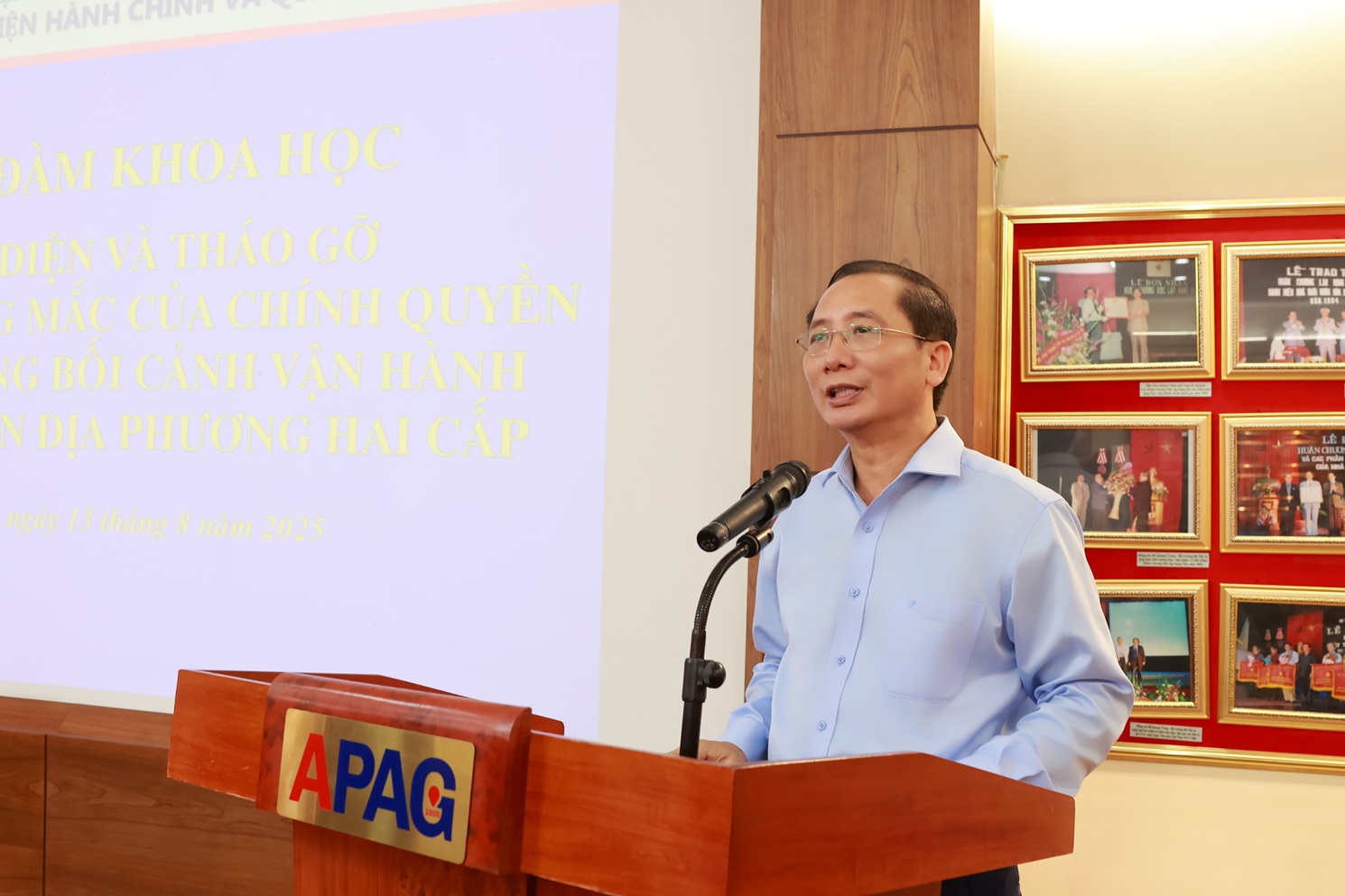 Assoc. Prof. Dr Nguyễn Bá Chiến, Party Secretary and President of APAG, delivers the opening address.
Assoc. Prof. Dr Nguyễn Bá Chiến, Party Secretary and President of APAG, delivers the opening address.In his opening address, Assoc. Prof. Dr Nguyễn Bá Chiến affirmed that the restructuring of administrative–territorial units and the operation of a two-tier local government model constitute a major guideline and policy of strategic significance of the Party and the State of Viet Nam. The objective is to build a lean, effective and efficient political–administrative apparatus that is closer to the citizen and better oriented to public service delivery.
After 43 days of operating the two-tier model, the system has functioned stably without unforeseen disturbances and has achieved its predetermined objectives. The entire political system has transitioned synchronously and rapidly nationwide; normative legal instruments and implementing guidance have been promulgated in a timely manner, ensuring a complete legal–institutional framework for the new operating model; and the people have expressed support.
At the same time, implementation has surfaced issues requiring prompt resolution. Specifically, a segment of cadres and civil servants exhibits capacity constraints and has yet to fully meet the workload intensity and the new task profile at the commune tier; physical facilities and information-and-communications technology (ICT) infrastructure remain unsynchronised; functional overlaps persist among units; and inter-tier and inter-sectoral coordination mechanisms are not yet seamless. The timely identification of bottlenecks and the proposal of concrete remedial solutions are therefore essential and urgent at this juncture.
Upholding the APAG’s mandate in specialised training and scientific research on public administration, state management and public governance, he invited experts, scholars, managers, APAG lecturers and, in particular, commune-level officials working directly at the grassroots to concentrate on the following focal themes:
First, analysing and assessing the current legal and institutional provisions governing commune-level authorities, thereby clarifying the role, functions, tasks and competences of commune-level government within the two-tier operating framework.
Second, identifying comprehensively and in depth the extant constraints and obstacles in the organisation and operation of commune-level government.
Third, sharing innovative approaches and good practices already adopted by localities in the practical operation of the two-tier model.
Fourth, proposing specific, feasible solutions for institutional and policy refinement and for resolving practical implementation issues.
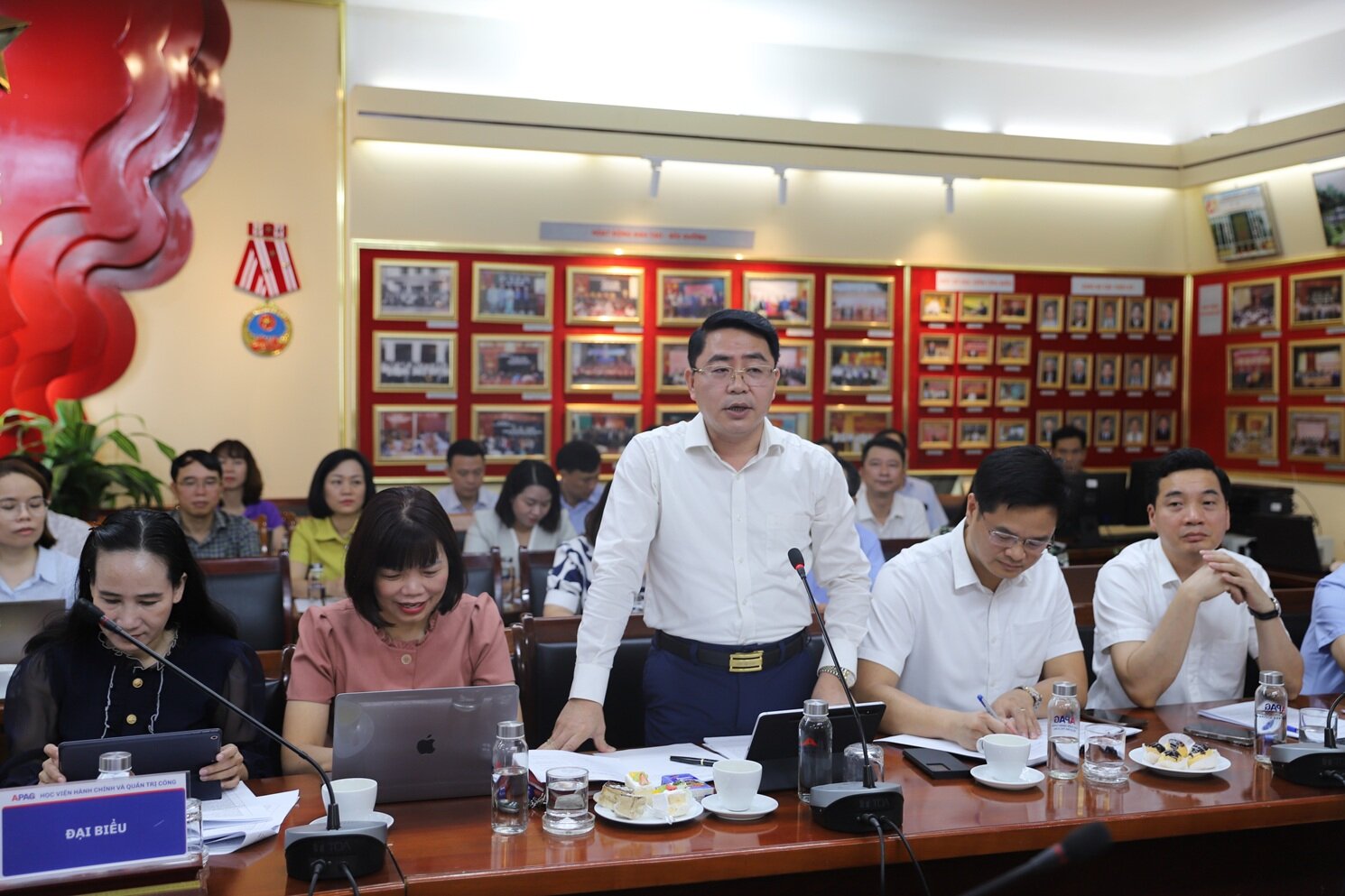 Mr. Nguyễn Mạnh Tiến, Head of Party Organisation, Tây Hồ Ward People’s Committee, Hà Nội, delivers remarks.
Mr. Nguyễn Mạnh Tiến, Head of Party Organisation, Tây Hồ Ward People’s Committee, Hà Nội, delivers remarks.Mr. Nguyễn Mạnh Tiến noted that, alongside recorded results, restructuring under the new model has generated certain obstacles, notably that a portion of officials and Party members have yet to internalise clearly the present role of commune-level government (incorporating elements formerly situated at commune and at district level). He stressed the need for a shift in working mindset among commune-level cadres and civil servants. He also flagged practical inadequacies arising from the rearrangement and merger of commune-level administrative units—such as fragmentation in information reception, increased workload and capacity gaps—and proposed solutions including competency-based training, strengthened inter-tier coordination protocols and investment in infrastructure and the “digital citizen”.
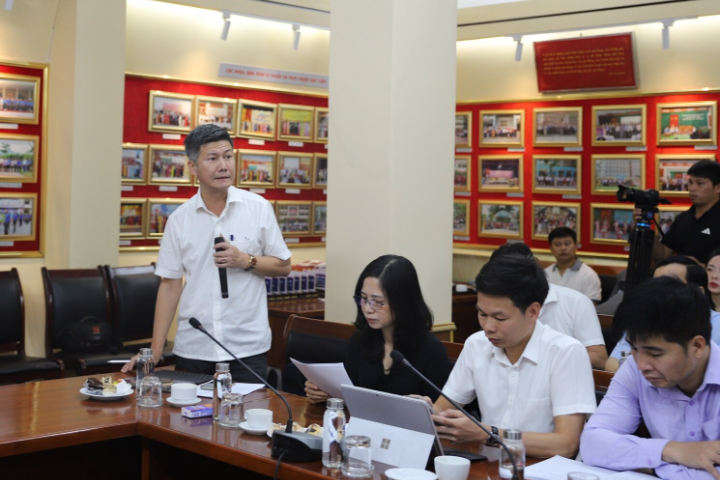 Mr. Bùi Ngọc Chính, Vice-Chairman of the People’s Committee of Từ Liêm Ward, Hà Nội, delivers remarks.
Mr. Bùi Ngọc Chính, Vice-Chairman of the People’s Committee of Từ Liêm Ward, Hà Nội, delivers remarks.Mr. Bùi Ngọc Chính affirmed that capacity differentials exist among public officials when assuming new job positions, especially with regard to foundational skills. He also pointed to overlaps across regulatory documents and in functions and tasks among units, leading to the risk of responsibility-shifting. He proposed comprehensive capacity-building plans, enhanced self-learning and the issuance of clearer, more specific implementing guidance.
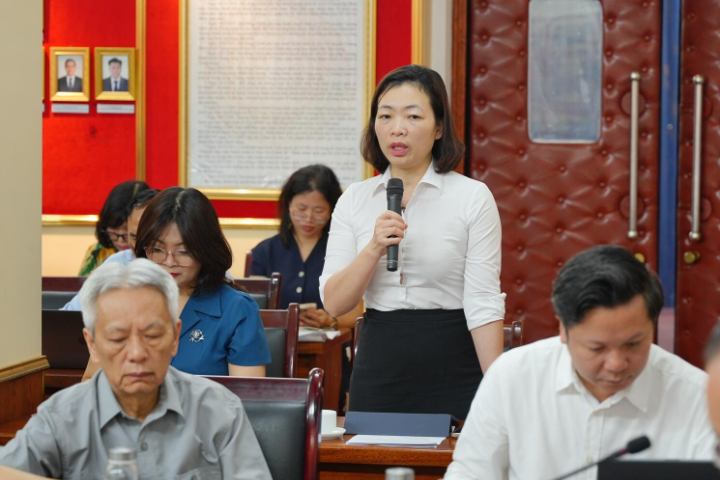 Ms. Nguyễn Thị Thu Hằng, Standing Deputy Secretary of the Party Committee of Long Biên Ward, Hà Nội, delivers remarks.
Ms. Nguyễn Thị Thu Hằng, Standing Deputy Secretary of the Party Committee of Long Biên Ward, Hà Nội, delivers remarks.Sharing experience from the principle “if the specialist cannot do it, the deputy will; if the deputy cannot do it, the head will,” Ms. Nguyễn Thị Thu Hằng assessed that, although awareness among public officials is relatively sound, transitional processes have produced non-uniform documents and unsynchronised operations. She further referred to workload pressures stemming from larger organisational scale, more numerous and diversified functions and tasks, partial mis-alignment of competencies and a tendency among some officials to request resignation following mergers.
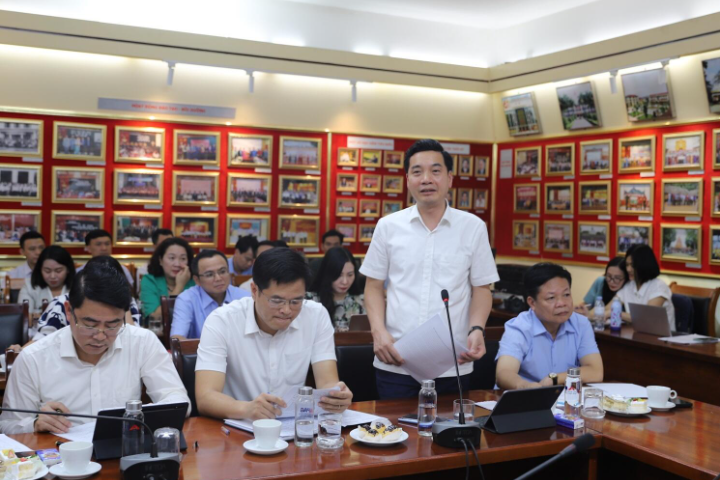 Mr. Nguyễn Việt Hà, Party Secretary and Chairman of the People’s Council of Gia Lâm Commune, Hà Nội, delivers remarks.
Mr. Nguyễn Việt Hà, Party Secretary and Chairman of the People’s Council of Gia Lâm Commune, Hà Nội, delivers remarks.Mr. Nguyễn Việt Hà highlighted constraints relating to organisational structure, job-position design and digital transformation. He argued that job-position schemes must be anchored in local realities. In parallel, there should be synchronised arrangements aligning village and residential-group models with the commune-level government model. He also proposed calibrated remuneration regimes and an increased number of deputy-level positions to alleviate workload pressures.
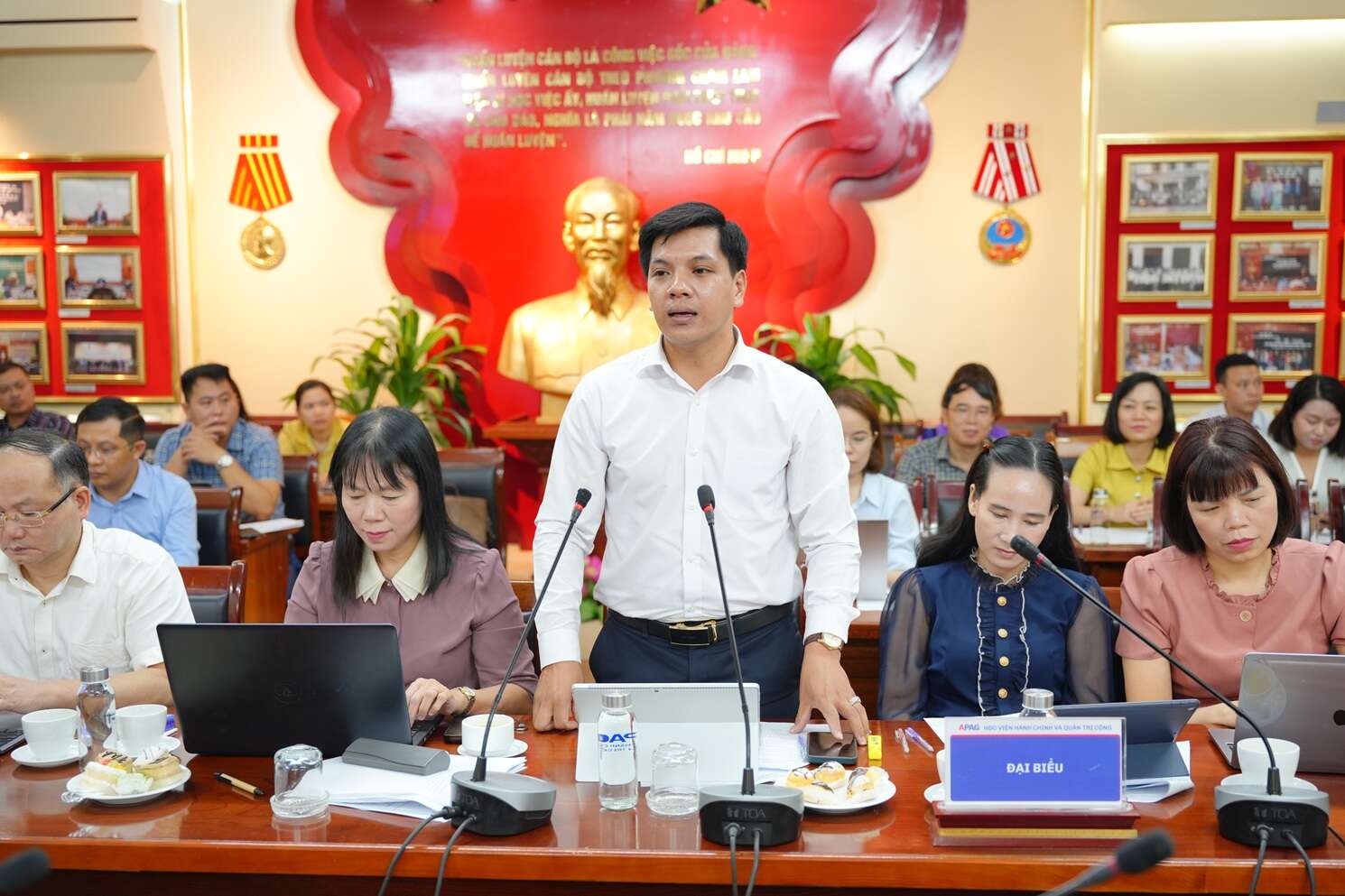 Mr. Trịnh Việt Khái, Vice-Chairman of the People’s Committee of Trần Văn Thời Commune, Cà Mau Province, delivers remarks.
Mr. Trịnh Việt Khái, Vice-Chairman of the People’s Committee of Trần Văn Thời Commune, Cà Mau Province, delivers remarks.Pointing to difficulties in personnel assignment not aligned with actual needs and in the application of guiding documents, Mr. Trịnh Việt Khái raised issues of rising volumes of administrative procedures at commune-level one-stop service centres and of barriers faced by rural residents when using online public services. He proposed delegating specific tasks to specialist divisions to reduce pressure on leadership; supplementing human resources for technical units; and strengthening support measures to assist citizens in accessing digital public services.
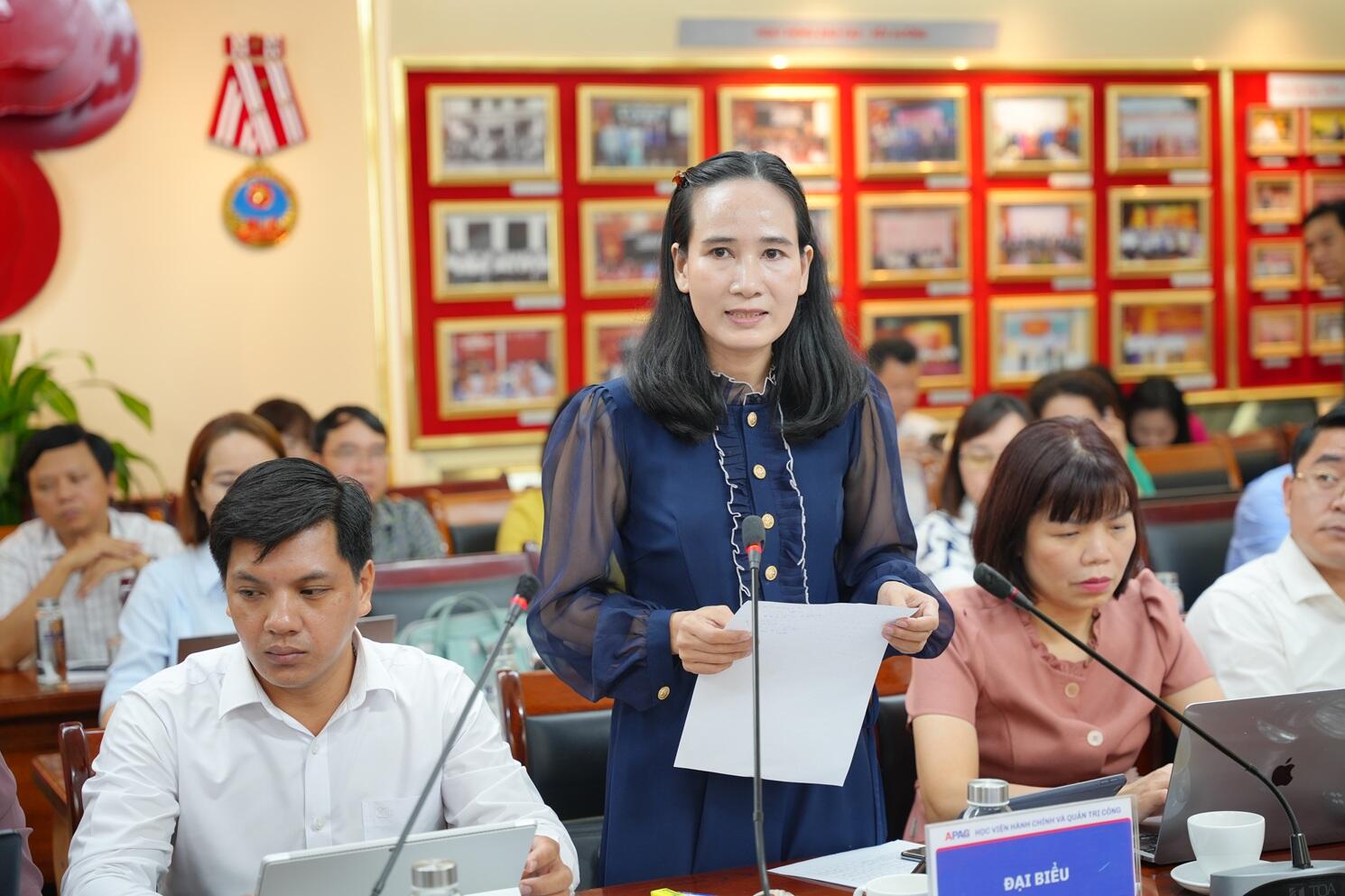 Ms. Lê Thị Kim Liên, Chairwoman of the People’s Committee of Long Nguyên Ward, Hồ Chí Minh City, delivers remarks.
Ms. Lê Thị Kim Liên, Chairwoman of the People’s Committee of Long Nguyên Ward, Hồ Chí Minh City, delivers remarks.Emphasising work overload as departments are streamlined while workloads do not correspondingly decrease, Ms. Lê Thị Kim Liên observed that commune-level officials lack sufficient expertise to handle complex administrative procedures, and that digital-government infrastructure has not fully met citizen needs after mergers. She proposed appropriate redeployment of specialist officials, increasing deputy-level positions, establishing rapid-response management teams to address bottlenecks and creating review teams to cull non-value-adding tasks, thereby further reducing administrative procedures and paperwork.
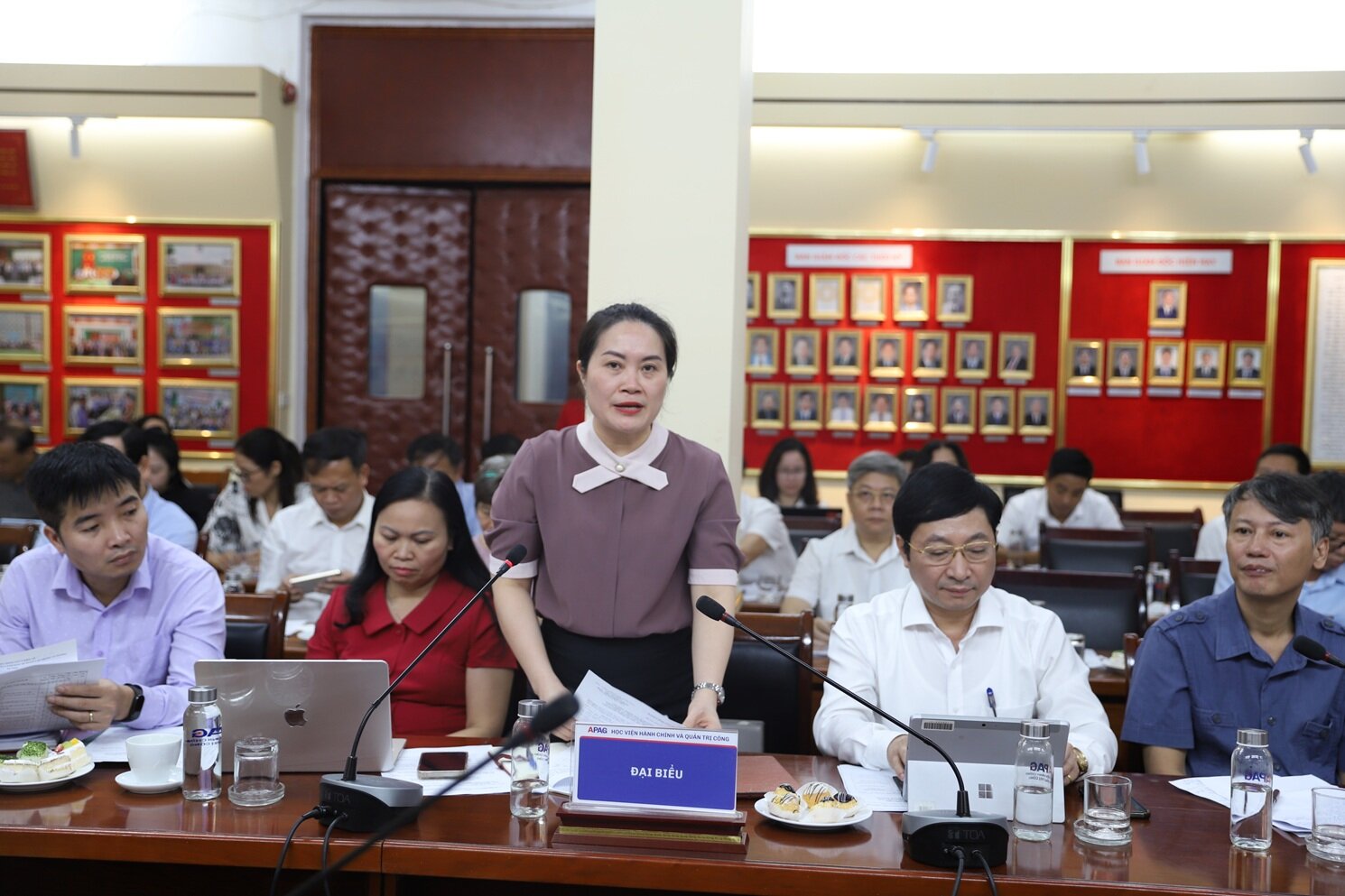 Ms. Đồng Thị Nga, Vice-Chairwoman of the People’s Committee of Hoài Đức Commune, Hà Nội, delivers remarks.
Ms. Đồng Thị Nga, Vice-Chairwoman of the People’s Committee of Hoài Đức Commune, Hà Nội, delivers remarks.Ms. Đồng Thị Nga underscored capacity gaps among commune-level officials in implementing the new model. She also cited unsynchronised ICT infrastructure and system overloads when using the national public-service software amidst large volumes of administrative procedures. She proposed infrastructure synchronisation, software upgrading and integration with the National Public Service Portal to enhance interoperability and service quality.
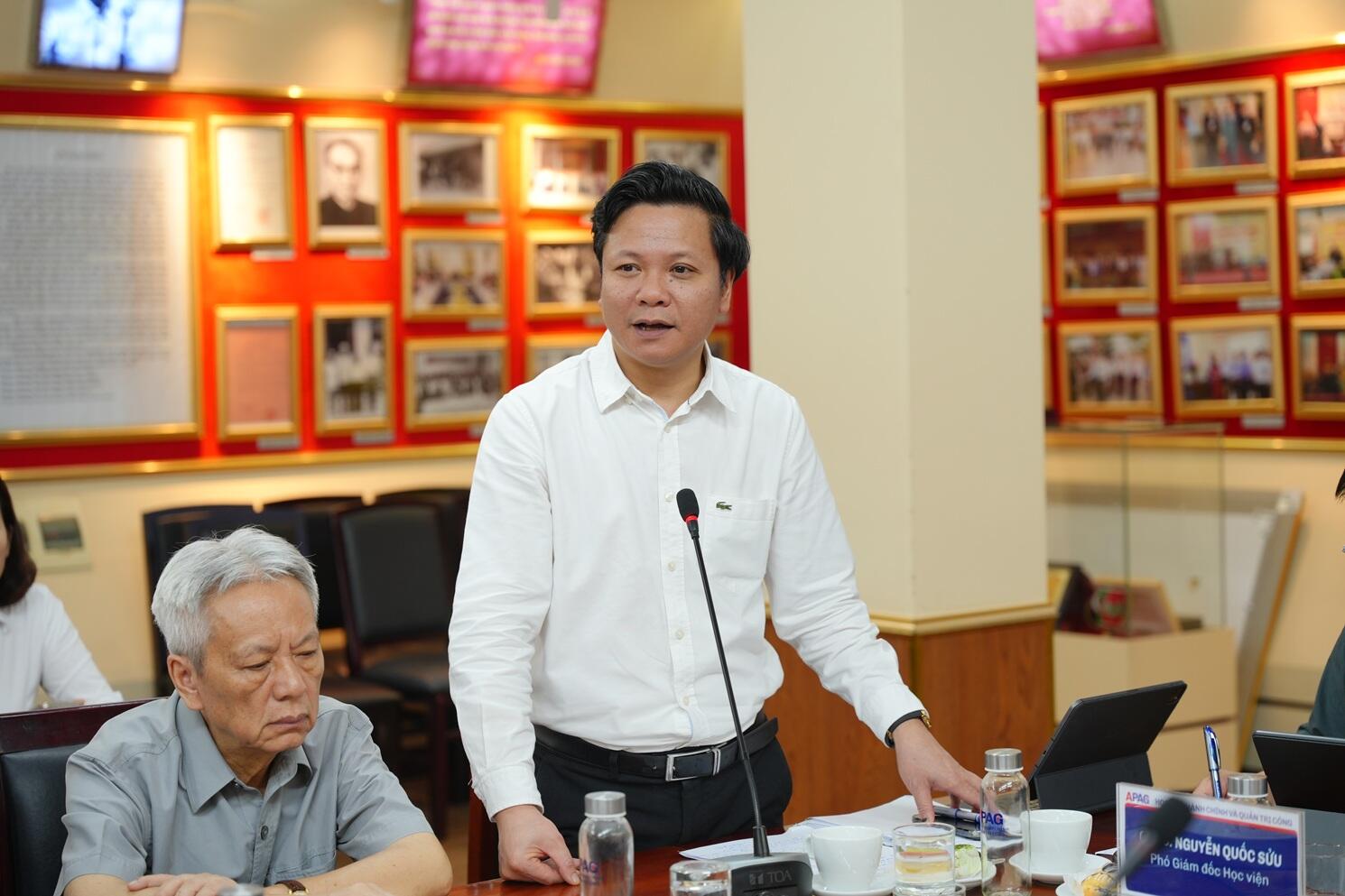 Mr. Phan Trung Tuấn, Director-General, Department of Local Government, Ministry of Home Affairs, delivers remarks.
Mr. Phan Trung Tuấn, Director-General, Department of Local Government, Ministry of Home Affairs, delivers remarks.Synthesising the opinions presented, Mr. Phan Trung Tuấn stated that the operation of the two-tier local government has yielded very positive results. Simultaneously, MoHA has identified newly arising inadequacies: institutional and policy frameworks and legal documents that are not yet fully synchronised; heavy workload with 1,065 administrative procedures and operations undertaken at commune level; the capacity of a segment of commune-level officials not yet meeting the demands of the new model; bottlenecks in determining job positions and personnel structures; and ICT infrastructure and digital transformation not yet meeting operational requirements. Accordingly, MoHA is reviewing and compiling feedback from localities to formulate solutions and report to competent authorities for resolution from the institutional and policy angle.
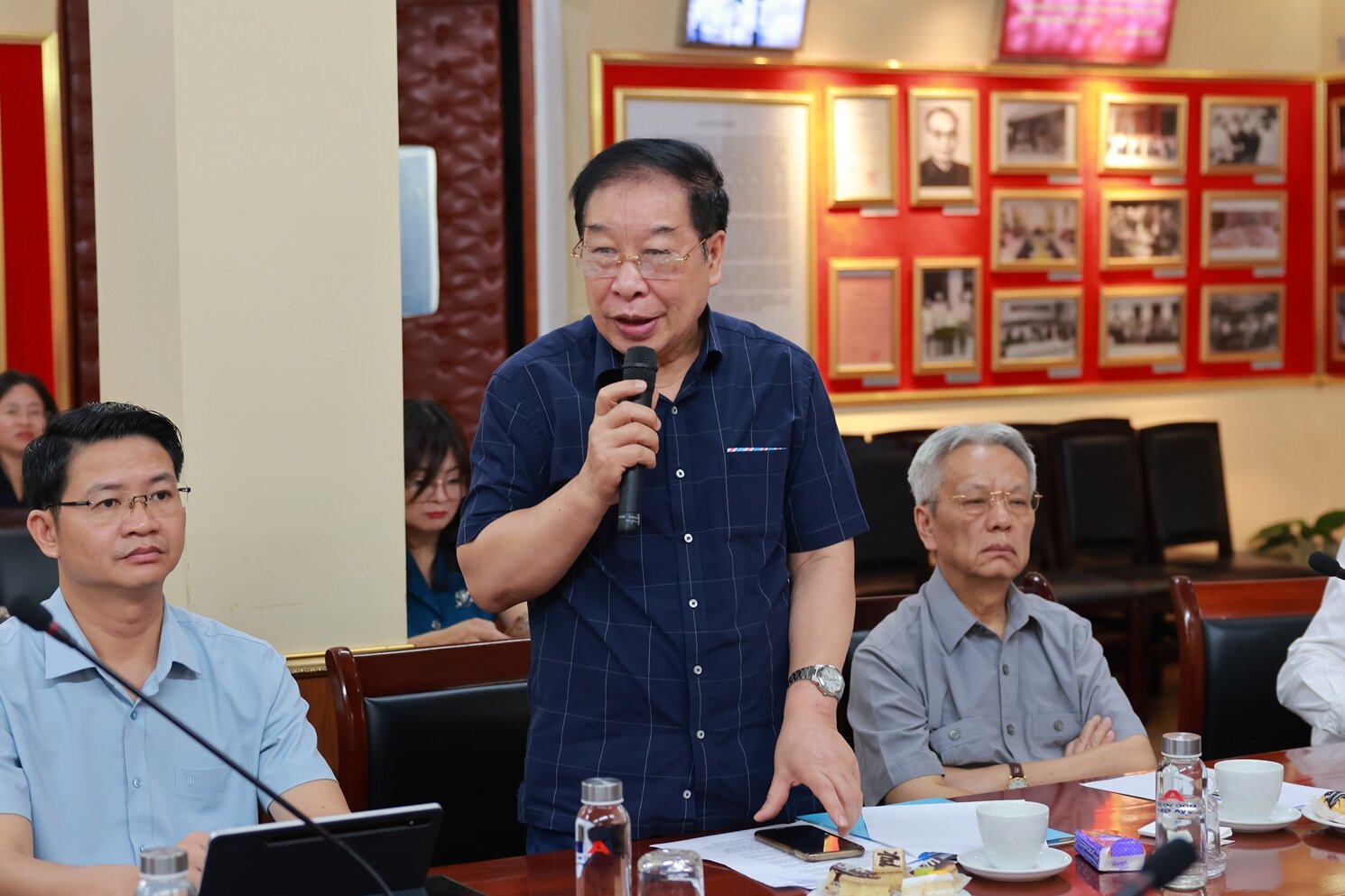 Assoc. Prof. Dr. Lê Minh Thông, former Vice-Chairperson of the National Assembly’s Committee on Legal Affairs, delivers remarks.
Assoc. Prof. Dr. Lê Minh Thông, former Vice-Chairperson of the National Assembly’s Committee on Legal Affairs, delivers remarks.Analysing the reallocation of competences from the district tier to the commune tier—which has made commune-level task loads excessive—Assoc. Prof. Dr. Lê Minh Thông proposed restructuring task allocation, promoting socialisation in appropriate service areas and recalibrating relations between the provincial and commune tiers to enhance fiscal decentralisation and budgetary autonomy for communes. He emphasised the need to invest in infrastructure and data systems and to simplify administrative procedures.
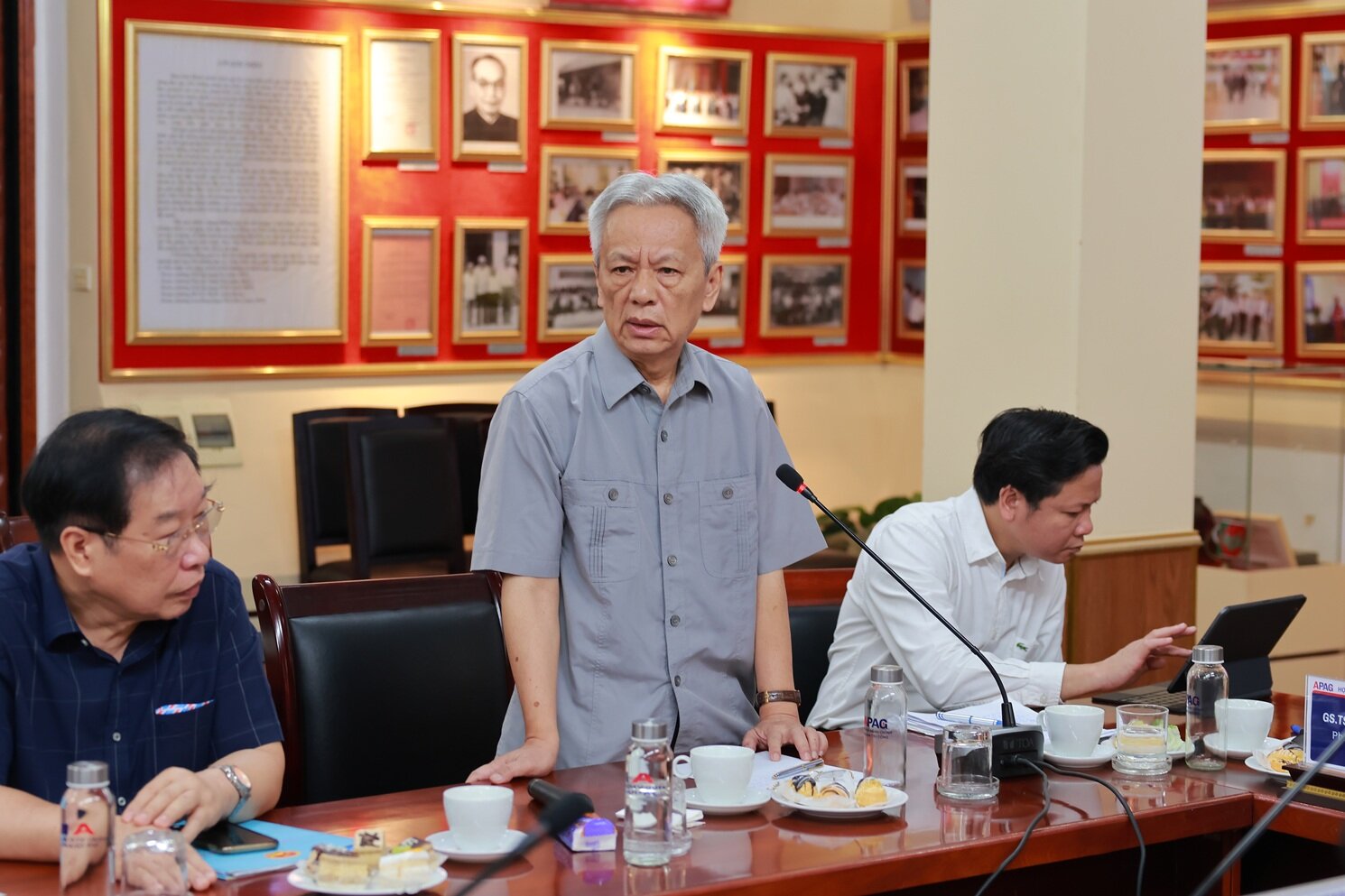 Dr Nguyễn Sỹ Dũng, former Deputy Chairman of the Office of the National Assembly, delivers remarks.
Dr Nguyễn Sỹ Dũng, former Deputy Chairman of the Office of the National Assembly, delivers remarks.To operationalise the delegation principle articulated by General Secretary Tô Lâm—“local decides, local implements, local takes responsibility”—Dr Nguyễn Sỹ Dũng proposed comprehensive reform of the legal system in line with the spirit of Politburo Resolution No. 66-NQ/TW of 30 April 2025 on renewing law-making and law-implementation to meet the requirements of national development in the new era; an organisational apparatus structured around public service delivery; and research into supplementary delegation models, such as those of Germany and Japan, for appropriate application in Việt Nam.
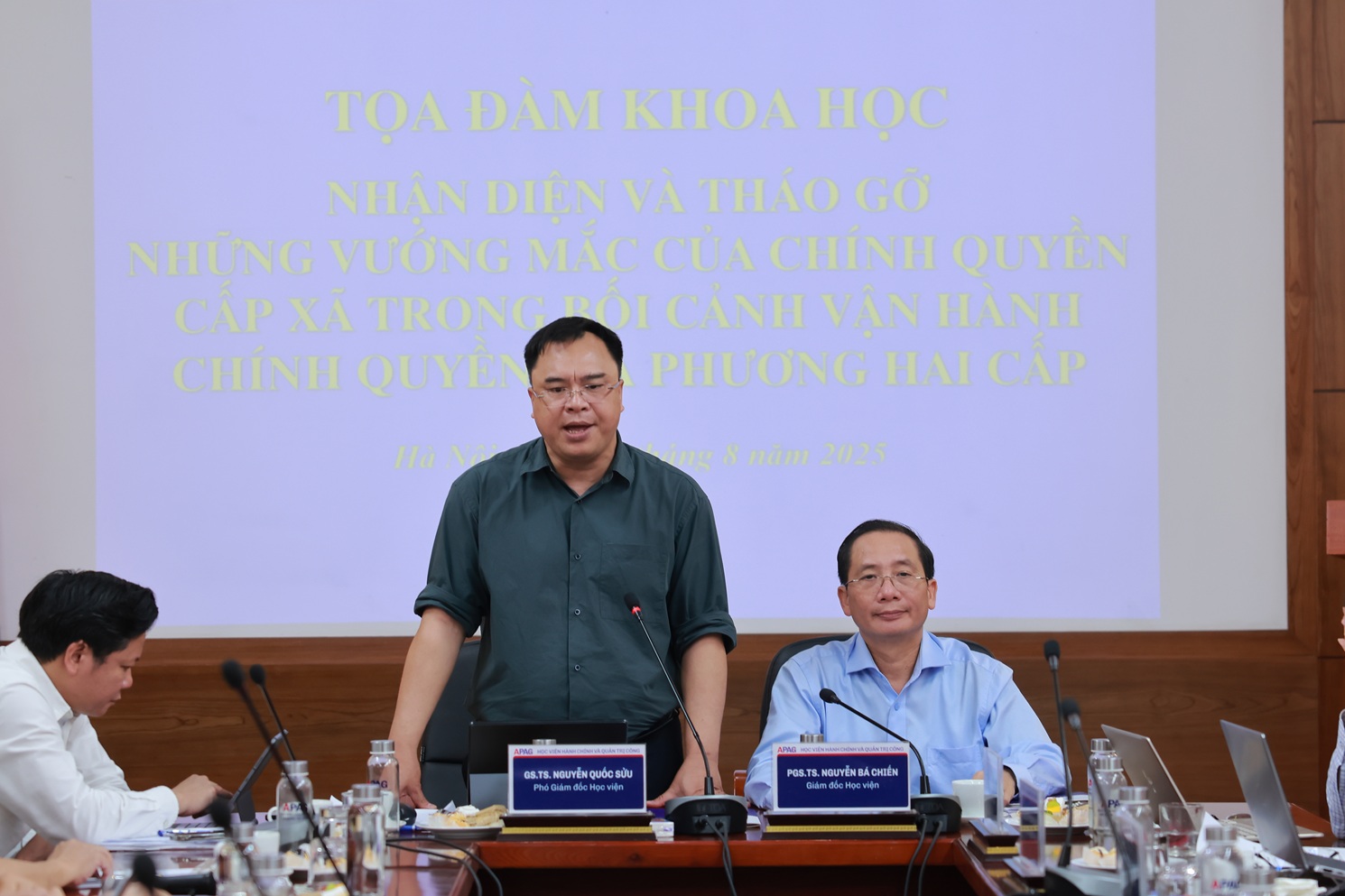 Prof. Dr Nguyễn Quốc Sửu, Vice President of APAG, delivers the concluding remarks.
Prof. Dr Nguyễn Quốc Sửu, Vice President of APAG, delivers the concluding remarks.In his concluding remarks, Prof. Dr Nguyễn Quốc Sửu affirmed that building a two-tier local government evidences the Party and the State’s strategic vision, meeting the requirements of local governance, national governance and sustainable development in the current context.
Through the seminar, difficulties and obstacles in implementation have been identified; localities have shared good practices and rich practical experience; and, notably, managers and scholars have offered recommendations and proposals. On that basis, APAG will compile and report to competent authorities: which challenges stem from institutions and policies; which obstacles arise from the capacity of local officials and civil servants; which difficulties result from inter-tier coordination; and which issues emerge from practical application of the new model.
Fulfilling its role and mission, APAG will proactively advise and propose to HCMA and relevant agencies the design and development of appropriate training and professional upskilling programmes to enhance the competencies of public officials, especially at the commune tier; accompany localities in providing technical assistance to resolve practical difficulties and obstacles; and compile and report to competent authorities to advise the Party and the State on the continued improvement of policies and laws so that the two-tier local government model operates effectively in the new context, in accordance with the directive of General Secretary Tô Lâm “straight rows, clear paths, united in moving forward.”
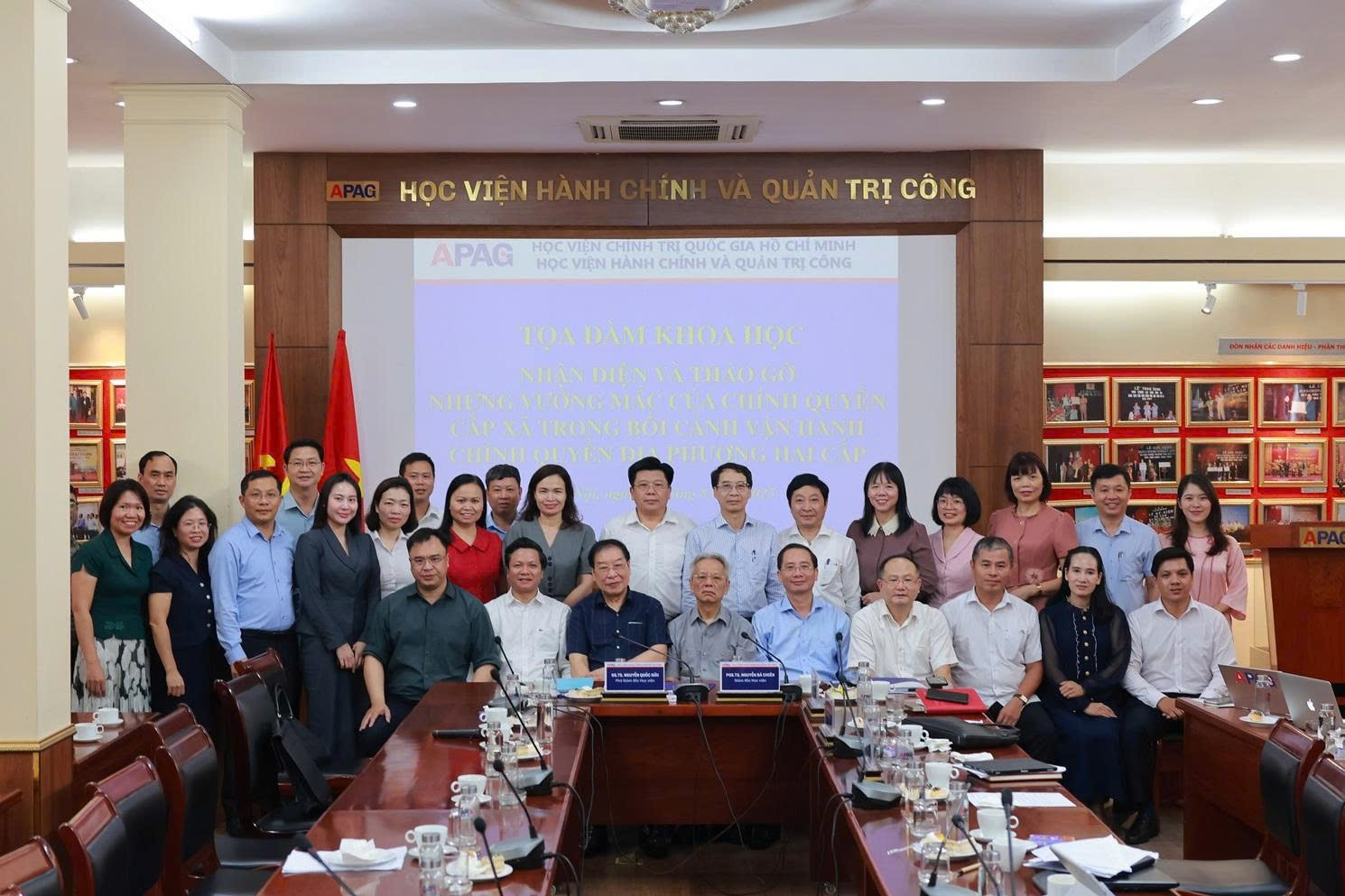 Delegates at the seminar.
Delegates at the seminar.